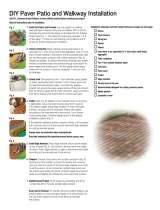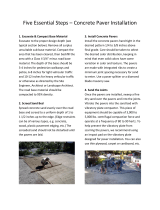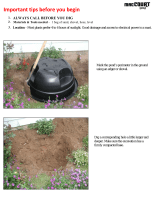Page is loading ...

DIY Edger Installation
1. Stake Out Project and Excavate. Begin by laying out the project
using stakes and a string line (or a garden hose for curves). Dig
a trench 1 to 2 inches wider than the edger. A minimum of 2
inches of edger should be buried below grade (Fig. 1).
2. Create Leveling Pad. Firmly compact the soil in the bottom of
the trench with a tamper. Place 1 inch of paver base in the
bottom of the trench and rmly compact (Fig. 2). Base
material can be paver base or an equivalent to
3
/
4
-inch minus
(with nes) aggregate.
3. Lay Edgers. Position edger units end to end in the trench.
Using a rubber mallet, tamp the edgers rmly into place. Use a
carpenter’s level or straightedge to ensure the edger units have
a uniform height (Fig. 3). Continue to place the units until the
desired length of the project is reached.
4. Cut and Backfill. If necessary, edger units may be cut using a
circular saw or tub saw with a diamond blade designed for
cutting concrete pavers, or be split with a hammer and chisel
(Fig. 4). Finish project by backlling and rmly compacting dirt
in front and back of edger.
Always wear eye protection when sawing blocks.
Read and understand the operating manual before using a saw.
Call 811, Common Ground Alliance, to have utilities marked before starting your project.
Read all instructions prior to installation.
Minimum
Outside
Diameter:
72 inches
(6 feet)
Installation materials and tools needed
(reference images on last page):
Gloves
Stakes
String line
Garden hose
Tape measure
Shovel
Tamper
Paver base or an equivalent to
3
/
4
-inch minus (with fines)
aggregate
Rubber mallet
Carpenter’s level or straightedge
Circular saw or tub saw
Diamond blade designed for cutting concrete pavers
Safety glasses
Hammer
Chisel
Minimum
Radius:
36 inches
(3 feet)
Radius reference for Anchor Edger™ Bullet Edger:
Edger Project Material Calculators
1. Plan the dimensions of the nished project, accurate to nearest inch.
3.
Calculate base material (paver base or
3
/
4
-inch minus [with nes] aggregate) needed for project.
calculate the volume of base
volume of base (cu. in.)
length of
project (in.)
______ X 6 =
X
compensation
for compaction
compensation for compaction
cubic inches of base material
_
:
1,728
=
=
total cubic feet of base material
2. Select edger, then calculate number of edgers needed for project.
project length in inches
length of project (in.)
length of edger (in.)
minimum # of edgers*
edger length in inches
estimated # of edgers
=
1.05*
X
* It is recommended that you purchase 5 percent more product than estimated to account for cutting and breakage.
1.25
=
_
:
Fig. 1
Fig. 2
Fig. 3
Fig. 4
trench width
x base depth
(sq. in.)

Complete installation materials and tools reference images:
Adhesive
Rubber
mallet
Stakes
String
Shovel
Hammer and Chisel
Level
Safety glasses
Tamper
Gloves
Circular
saw
Tub saw
Garden
hose
Plate
compactor
1" Pipes
Spikes
Edge
restraint
Paver
base
Drainage
aggregate
Paver
sand
Diamond
blade
Tape
measure
Trowel
Rake
Carpenter's
pencil
2x4
board
/




